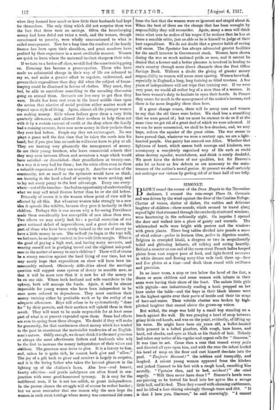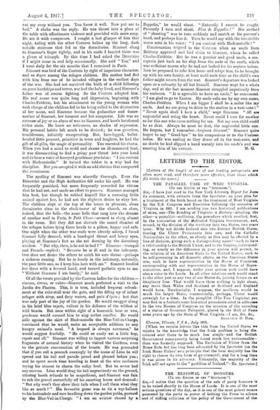SDIONET.
BLOWN round the corner of the Deer Magets in the November darkness, I crossed the rain-swept Place St. Germain and was driven by the wind against the door of the Cantina Refuge. Chatter of voices, clatter of dishes, the sudden and delicious laughter of children—these sounds, which seemed to travel along rays of light that streamed through the carelessly shuttered windows, were heartening in the unfriendly night. On impulse I opened the door and walked into a plasm of gaiety and warmth. The whitewashed walls were bright with posters and the windows with green plants. Three long tables divided into panels a mass of vivid colour—poi/us in horizon blue, poilus in Algerian scarlet, Belgians in crumpled khaki, a dragoon or two in magnificently tailed and glittering helmets, all talking and eating heartily. Behind a counter at one end of the room stout Preneh ladles heaped plates from vast copper pans of food, and light-footed scrotum, in white dresses and flowing navy-blue veils took them up—four and five plates at a time—and dealt them round with swiftness and precision.
In an inner room, a step or two below the level of the first, a dozen or more children and some women with infants in their arms were having their share of the feast. The sedate little girls with pigtails—one industriously reading a book propped on her knee under the table—and, the boys in their black blouses were in the highest spirits over their parts of lentils and their tin mugs of beer-and-water. ThPir voluble chatter was, broken by high. pitched laughter that soared above the grown-up voices.
But withal, the stage was held by a small boy standing on a bench agaimit the wall. He was grasping a bowl of coup between grimy little red hands, and was on the point, evidently, of lifting up his voice. He might have been six years old, a bullet-headed little peasant in a belted pinafore, with rough, bare knees, and hard, red cheeks, and eyes as black as his thatch of hair. Nobody had taken any notice of his regular and urgent calla for " Simonlie." It was time to see Came then a roar that roused every poila and directed all eyes upon him, and with the roar the infant hurled his bowl of soup on the floor and cast himself desolate into the pool. " Toujoura Simonet /" the soldiers said tranquilly, and laughed. A robust young woman appeared from the kitchen and jerked Simonet to his feet with a rough hand, smacking him soundly. "Upstairs then, and to bed, michant / " she cried angrily. "Wilt thou never have done ? " Simonet's howls were ear-piercing as he butted his head into her elven like a savage little bull, and kicked. Then they ceased-wite atarmingsaddenitess, and be lifted a face shining adoringly through tears and dirt " It is that I love you, Simonne," he said caressingly. "1 cannot
eat my soup without you. You know it well. Now put me to bed." A shake was the reply. Ile was thrust into a place at the table with affectionate violence and provided with more soup. He ate it with composure. I caught a last glimpse of him that night, toiling with the other Canteen babies up the long, dark outside staircase that led to the dormitories. Simonet clung to Simonne's finger tightly, and in his smile I fancied there was a gleam of triumph. By this time I had asked the Directrice if I might come in and help occasionally. She said "Yes," and I went daily for the aix months that I remained in Paris.
Simonet was lord of the Canteen by right of imperious character, and as doyen among the refugee children. His mother had fled with him from one of he invaded villages in the earliest days of the war. She had not survived the birth of a child following on great hardships and terror, nor had the baby lived, and Simonet's father was of course fighting. So the Canteen adopted him. His real name was quite long and iinpressive, beginning. with Chaties-Frederic, but his attachment to the young woman who took charge of the children led to his being called in the diraiautive of -her name, and Simonne became the godmother and foster' mother of Simonet, her torment and her conqueror. Life was an extreme of joy or an abyss of woe to Simonet, and howls betokened either state. He knew no reticence.% no shades of expression. His personal habits left much to be desired he was graceless, troublesome, infinitely exasperating. But, barelegged, bullet- headed little peasant, primitive in tears and laughter, he had the gift of all gifts, the magic of personality. You resented his charm. When you had a mind to scold and shame an ill-mannered brat, it was disconcerting to find a grimy paw thrust into your hand and to hear a voice of honeyed gentleness proclaim : "I am content with Mademoiselle." It turned the tables in a way bad for discipline. But you accepted it with an odd elation that conquered the resentment.
The spoiling of Simonet was absurdly thorough. Even the Directrice and the High Authorities fell under his spell. He was frequently punished, but more frequently rewarded for virtues that he had not, and made no effort to possess. Simonne managed him best, but though he rubbed himself like a caressing little animal against her, he had not the slightest desire to obey her. The children slept at the top of the home in pleasant, dean dormitories close to the clock-tower of the church, so close, indeed, that the bells—the same bells that rang into the dreams of another waif in Paris, to l'efit Chose—seemed to clang almost in the room. But they did not disturb the sound slumber of the refugee babies lying three heads to a pillow, happy and safe. One night when the other war-waifs were already asleep, I found Simonet fully dressed, with a bandaged throat and heavy eyes, playing at Simonne's feet as she sat darning by the dormitory window. "But why, then, is he not in bed " Simonne—tranquil and French—replied : "Because he is ill and in the infirmary. One does not desire the others to catch his sore throat—perhaps a sickness coming. But he is lonely in the infirmary, naturally, the poor little one, so I keep him hero with me." Simonet fondled her dress with a fevered hand, and turned pathetic eyes to me. "Without Simonne I am lonely," he said.
Of all the treats provided by the Canteen lathes for the children— cinema, circus, or cakes--Simonot much preferred a visit to the Jardin des Plantes. This, it is true, included frequent refreeh- ment at the cake-stall near the gate, and the filling up of infant refugee with eirop, and fizzy waters, and pain d'Ipiee ; but that was only part of the joy of the garden. He would swagger along in his brief blue capote, valiant in his defiance of the wildest of wild beasts. But once within sight of a homesick bear or two, prudence would counsel him to sing rather smaller. Ho would sidle against the .skirt of Mademoiselle the Blue-Veil-in-Charge, convinced that he would. make an acceptable addition to any hungry animal's meal. "A leopard is always ravenous," he would suggest fearfully. "He could so easily eat a little boy, capole and all." Simonet was willing to impart various surprising fragments of natural history when he visited the Gardens, even to the private conversation of the beasts. He was persuaded that if you call a peacock coaxingly by the name of Leon he will spread oat his tail and parade proud and pleased before you ; and he spent much time kneeling in front of the wire enclosure trying his utmost to charm the sulky fowl. But he never bad any success. Leon would drag his tail ungraciously on the ground, uttering harsh refusals to be magnificent, and Simonet was fain to rub the gravel sorrowfully off his smarting knees and demand : "But why won't they show their tails when I call them what they like so much ? " His favourite game was to tie a toy-balloon to his buttonhole and race headlong down the garden paths, pursued by the Blue-Veil-in-Charge. "1 am an aviator chased by a Zeppelin," he would shout. "Naturally I cannot be caught. Presently I turn and shoot. Plus de Zeppelin ! " His method of " shooting " was to hum suddenly and snatch at his pursuer's band, and perhaps kiss it. Then he would say with the irresistible warm note in his voice : "I am content with Mademoiselle ! "
Consternation reigned in the Canteen when an uncle from Brittany appeared and laid claim to Simonet, whom he °ailed Charles-Frederio. But he was a genuine and good uncle, a sea- captain just back on his ship from the ends of the earth, which was sufficient reason why he had not looked for his nephew before. Now he proposed to take him home and adopt him, to be brought up with his own family, at least until such time as the child's own father might return from the war. Simonet's departure was looked upon as a calamity by all but himself. Simonne wept for a whole day, and at the last moment Simonet struggled impatiently front her embrace. "It is agreeable to have an uncle," he announced. "lass glad to go to Nantes. My uncle calls me by my own name, Charles-Frederic,. When I am bigger I shall be a. sailor like my uncle. And we are going to drive to the station in a taxi-auto I" " Never again shall I love a child," wept Simonne. "MI ars ungrateful and wring the heart. Never could I care for another as for this one who cares nothing for me. Not my own childsould be so dear. Always he mast be first, the ungrateful little one. He forgets, but I remember—toujoure Simonet." Simonet quits forgot to say " Good-laye " to his companions or to the Canteen ladies. He was smiling as they drove off in the taxi-auto, and no doubt he had slipped a hand warmly into his uncle's and was assuring him of his content.



























 Previous page
Previous page